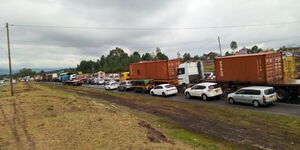Kilifi, Meru and Migori Counties are leading in divorce cases and separation triggered by land issues, a new survey has revealed.
The National Crime Research Center (NCRC), in its Baseline Study on Land-Related Crimes and Offences in Kenya report, indicated that a total of 200 divorce cases were been reported from the three counties in the past year due to land disputes.
The divorces were linked to about 13.6 per cent of land cases reported to the Ministry of Lands, according to the study.
The report quoted a Kitui livestock officer who noted that some divorce cases happened because of unresolved issues in the relationships as a result of time spent in courts resolving land disputes.
“…the consequences range from animosity and fighting hence referrals to police and courts thus a lot of money is wasted on lawyers and court processes and of course, community disharmony creeps in. All this drains resources from the owners, community disharmony and family disunity, also no place to do farming," the informant said.
According to the report, when a land-related case results in eviction, it is common for couples to assign blame and harbour resentment towards each other, especially if the dispute is related to the partner's action or decision. The blame game can escalate conflicts and push the couple towards divorce as they struggle to find a resolution.
Additionally, the report cited that property disputes and land-related crimes reveal differences in priorities and values within a marriage.
One partner may be more focused on protecting their property rights, while another may prioritise compromising and resolving the land dispute. These different priorities, according to the survey, lead to conflicts that are difficult to resolve, often leading to the couple filing for divorce.
In some cases, land-related crimes create rifts within a family where disagreements over land boundaries, inheritance or land ownership can lead to social pressure where family members take sides. Such pressure often leads to conflict within the marital relationship and contributes to the couple going their separate ways.
The survey sought to investigate the impact of land-related crimes and how they affected society either socially, economically, or politically.
About 705 survey participants noted that land-related crimes increased poverty while 693 pointed out family disharmony as another social consequence.
Also, 650 indicated that the cases led to loss of lives within the family while 449 said that most get evicted from their homes as a result of the disputes.
"There is hatred among community members, farmers-herders conflicts especially of Somali origin and farmers in Kilifi County who are locals, this has led to assaults, deaths - especially killing of the old people. The young boys are killing the old to buy motorbikes, displacements of communities, underdevelopment and perpetual conflicts, also environmental degradation and increased poverty in this area…” read the report in part.
From the findings, the most reported land cases mentioned were land grabbing, fraud, trespass, forgery, double allocation, encroachment on reserved parcels of land, and eviction among others.
Cases involving land brokers led with 41.4 per cent, followed by family members (39.7 per cent), neighbours (35.1 per cent) and corrupt government officials (21.9 per cent),
According to respondents, most of the institutions are ineffective in dealing with land-related cases.
They preferred the elders (65.8 per cent) to deal with the disputes, followed by family (56.4 per cent), National Government Administrative Offices (51.2 per cent), Judiciary (39.9 per cent) church (29.9 per cent), and the State Department for Lands (29.7 per cent).












